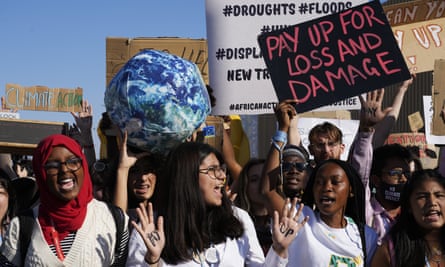There is a battle raging over the heart and soul of the UN Cop conferences, which have taken place every year since 1995. On one side are the climate scientists, policymakers, and representatives of countries most under threat from global heating and of nations that simply “get” the disastrous effects of the climate crisis. On the other side is the fossil-fuel industry.
The battle has largely been fought under the radar, but it has been going on for some time. And those who fly the fossil-fuel flag are on the brink of victory. The attack began seriously to gain ground at Cop25. First Jair Bolsonaro’s Brazil withdrew its offer to host the event, then stand-in Chile pulled out due to civil unrest. The Spanish government stepped up at the last minute, and so did its fossil-fuel corporations. The Spanish energy giants Iberdrola and Endesa – the latter one of the country’s biggest greenhouse gas emitters – paid wads of cash to become major sponsors and buy the right to have their logos plastered all over the conference venue.
At Cop26 in Glasgow in 2021 the fossil-fuel invasion continued, this time taking the form of more than 500 delegates representing oil, gas and coal interests. These were lobbyist shock troops charged with ensuring that their industry wouldn’t be hindered in its quest to use more fossil carbon. Last year, at Cop27 – hosted by Egypt at the Red Sea resort of Sharm el-Sheikh – the fossil-fuel sector consolidated its position by hiking its contingent to a whopping 636 delegates.
The 2023 climate conference, Cop28, will be held a few weeks before Christmas in the United Arab Emirates, and the fossil-fuel lobby already knows it is getting the best present it could ever wish for. Last week, the chief of the Abu Dhabi National Oil Company (Adnoc), Sultan Al Jaber, was paraded as the president of Cop28, making the triumph of the fossil-fuel sector complete. It’s like a big tobacco CEO hosting a cancer conference, except this time the health of the whole planet is at stake.

It beggars belief that the UN thought it a good idea to allow an authoritarian petro-state to host such a critical meeting at the height of the climate emergency. Given the UAE’s huge investment in oil and gas, it was always likely that there would be serious tensions at Cop28 between action on climate and the fossil-fuel industry. Handing the presidency to Al Jaber has compromised the conference beyond repair, reinforcing concerns that the whole Cop process simply isn’t fit for purpose.
Since the first Cop in Berlin in 1995, there have been 27 climate conferences (there were two Cop6s), and despite discussion and debate, promises and pledges, warnings and entreaties, emissions have just kept on going up. While early Cops welcomed a few thousand attenders, the latest had a whopping 35,000 delegates, and it is difficult now to view the events as anything other than bloated travelling circuses that are increasingly ineffectual.
Typically, once the ceremonials and photoshoots are out of the way, the first week or so of a Cop is taken up with manoeuvring and posturing on the part of national delegations. Things get a bit more focused in the second week, then panic sets in with a day or two to go, when it begins to dawn on the hosts that they need some sort of agreement to announce to the world. Quite frankly, any will do.
Last year, it was an admittedly encouraging deal on “loss and damage”, which seeks to ensure that developing nations affected by climate breakdown receive financial assistance. The year before, it was the grandly titled Glasgow climate pact, effectively code for “we will seek to do better, honest”. The promises never sound anything less than authentic, but they are rarely binding and there is no guarantee that they will end up doing what they say on the tin.
Read moare at: theguardian.com;
Photo: theguardian.com, Peter Dejong/AP,Karim Sahib/AFP/Getty Images


Leave a Reply